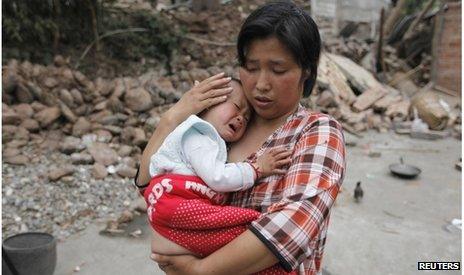Quake-hit Sichuan waits for help
- Published

Through the centre of Longmen village columns of soldiers march in green fatigues, shouldering shovels.
They jostle for space with military trucks and ambulances.
Eighteen thousand Chinese troops have been deployed to help in the aftermath of Saturday's earthquake. The rescuers have now reached Longmen and other villages that surround the quake's epicentre.
Longmen sits astride a river in one of Sichuan's high valleys. The land is lush and fertile, surrounded by high mountain ridges. Stands of bamboo sprout from the slopes. The fields are planted with sesame, spinach and rice.
But throughout this high valley, in every village and settlement now, homes are smashed, rubble lies in the streets, and roofs have caved in: the destruction brought by the shockwaves from the earthquake.
And everywhere too now there is fear. People live in fear of the next tremor. There have been hundreds of aftershocks in the 36 hours since the quake.
Every hour the tremors come. Some are barely noticeable. But others make the ground shake under your feet. First you hear a distant sound, a boom, like someone banging a giant drum.
Then the swaying begins.
'I couldn't run'
While we were in Longmen several shocks hit. People, already traumatised by the original quake shrieked, grabbed their children, and rushed to get away from any large buildings still standing.
"It was terrifying when the earthquake struck," Chen Yue Xian told us.
"There was nowhere we could escape to," she said. "Now I feel no place is safe. I have no sense of security. I feel I could be buried alive here and die."
Standing beside her, 52-year-old Zhang Mei Zhen said: "I heard my son calling, 'Mum run, run'. I got so scared I couldn't run. Bricks were falling on top of me as I got out. We were so scared."
In village after village, people too afraid to go back into any houses still standing are gathered outside. Some sit under awnings, some in the open, belongings piled next to them.
Clusters of new, blue tents have sprung up, delivered by the rescue teams. But many people have no shelter.
So families have salvaged furniture and are sitting on sofas out by the roadside, some have pulled mattresses and quilts from their damaged homes, others just have mats on the ground.
Everywhere, too, families have set up outdoor kitchens to prepare food. But many say they have received no help from the government yet, apart from a little drinking water for each person.
Yang Hua Fen wanted to show us how she now has to live. So she took us past a ruined cottage to show us the huge cracks that run through her two-storey, concrete house.
She has only a straw mat for a shelter, a bag of rice donated by relatives and some eggs. Flies crawl over everything.
"We have to eat this," she complains. "If we don't eat we are going to starve to death."
Then, getting angry she adds: "We need food, and a place to live, and water. We are drinking river water and we are getting headaches. Our children have no food to eat. Can you deliver the message to senior officials?"
Then she pulled out her mobile phone and waved it in the air.
"They say on the TV everything is great, but it's not. I am receiving text messages that tell me the government cares about us, that they are giving us this much money, this much food, but we haven't seen it," she says.
Queues of aid
Many it seems are getting frustrated and tempers are rising. Fifty-eight-year-old Gao Shi Qun stepped forward, anxious to have her say.
"We don't have any food to eat. We see the country's economy is getting greater and greater every year, but we haven't had any help, or money, it's never our turn to get something."
Her neighbour, Wang Zheng He, 77, and the dozen members of his family have only a small wooden shack as their house collapsed too. Mr Wang said the government's response hadn't been good enough.
"We have not got anything, only three bottles of mineral water each since the earthquake. The children are starved."
As he spoke his relatives spotted a village official walking past. They hurried to surround him, demanding to know "why haven't we got anything? How long are we going to have to wait?"
The official smiled a little helplessly. "We are just low level officials. We don't know. So far the biggest problem is supplies are not getting to us quickly enough. The first problem is tents, and we have a big problem of food."
I asked him: "People are hungry, their children have nothing to eat. What can you do for them?"
And he replied: "Because supplies are too slow, they will just have to fend for themselves."
The crowd, now angry, replied: "And how do we do that?"
As we headed out of Longmen back down the valley we found roads choked with army trucks and four-wheel-drive vehicles carrying emergency teams. Further down the hill were lines of trucks carrying more supplies.
Trying to get in, too, are many private volunteers, bringing food and water to help. But the authorities say the volunteers are simply clogging the roads, slowing everything.
One military officer in Longmen complained that the worst thing about this earthquake was the road up here. "All those volunteers bringing two packets of instant noodles each blocking the roads."
Whatever the reason for the lack of supplies, many are now sitting out in the open, frustrated and hungry. They have either lost their homes or are too afraid to return to them, and can do little but wait for aid.
- Published21 April 2013
- Published20 April 2013
- Published21 April 2013
- Published21 April 2013